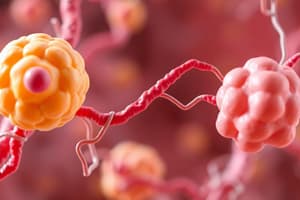Podcast
Questions and Answers
What are the main factors that stimulate Gluconeogenesis?
What are the main factors that stimulate Gluconeogenesis?
- Increased levels of Fructose-2,6- bisphosphate
- High levels of insulin and glucagon
- High concentration of lactate, glycerol, and amino acids (correct)
- High concentration of citrate, ATP, and Acetyl CoA
Which compound acts as an allosteric effector for PFK-1 and FBPase-1 enzymes in Gluconeogenesis regulation?
Which compound acts as an allosteric effector for PFK-1 and FBPase-1 enzymes in Gluconeogenesis regulation?
- AMP
- NADH
- Fructose-2,6-bisphosphate (correct)
- Acetyl CoA
What happens to the cellular level of Fructose-2,6-bisphosphate in response to Glucagon?
What happens to the cellular level of Fructose-2,6-bisphosphate in response to Glucagon?
- It remains unchanged
- It increases
- It converts to ATP
- It decreases (correct)
Which hormone signals the liver to produce more glucose when blood glucose levels decrease?
Which hormone signals the liver to produce more glucose when blood glucose levels decrease?
What is the role of insulin in the regulation of Gluconeogenesis?
What is the role of insulin in the regulation of Gluconeogenesis?
Which enzyme is inhibited by AMP and ADP but stimulated by citrate and ATP during Gluconeogenesis?
Which enzyme is inhibited by AMP and ADP but stimulated by citrate and ATP during Gluconeogenesis?
What inhibits the alpha-KGA dehydrogenase enzyme?
What inhibits the alpha-KGA dehydrogenase enzyme?
Which molecule can inhibit Citrate synthase and IDH in cellular respiration?
Which molecule can inhibit Citrate synthase and IDH in cellular respiration?
In vertebrate muscle, which molecule activates IDH and alpha-KGA dehydrogenase among the given options?
In vertebrate muscle, which molecule activates IDH and alpha-KGA dehydrogenase among the given options?
Which tissues primarily depend on glucose for their energy needs?
Which tissues primarily depend on glucose for their energy needs?
What is the process of synthesizing glucose from non-carbohydrate precursors called?
What is the process of synthesizing glucose from non-carbohydrate precursors called?
Which organ is responsible for about 90% of Gluconeogenesis in the body?
Which organ is responsible for about 90% of Gluconeogenesis in the body?
What is the compartment where gluconeogenesis mainly occurs?
What is the compartment where gluconeogenesis mainly occurs?
How many ATP molecules are needed for the synthesis of one glucose from 2 pyruvate or lactate?
How many ATP molecules are needed for the synthesis of one glucose from 2 pyruvate or lactate?
Which set of reactions in gluconeogenesis are the reverse of glycolysis?
Which set of reactions in gluconeogenesis are the reverse of glycolysis?
Which enzyme converts Fructose-1,6-bisphosphate to Fructose-6-phosphate in gluconeogenesis?
Which enzyme converts Fructose-1,6-bisphosphate to Fructose-6-phosphate in gluconeogenesis?
Which mitochondrial enzyme converts pyruvate to oxaloacetate in the first step of gluconeogenesis?
Which mitochondrial enzyme converts pyruvate to oxaloacetate in the first step of gluconeogenesis?
Where does pyruvate arise before being transported to the mitochondria during gluconeogenesis?
Where does pyruvate arise before being transported to the mitochondria during gluconeogenesis?
Flashcards are hidden until you start studying




